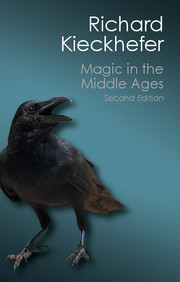Book contents
- Frontmatter
- Contents
- List of illustrations
- Foreword to the Canto edition
- Preface
- 1 INTRODUCTION: MAGIC AS A CROSSROADS
- 2 THE CLASSICAL INHERITANCE
- 3 THE TWILIGHT OF PAGANISM: MAGIC IN NORSE AND IRISH CULTURE
- 4 THE COMMON TRADITION OF MEDIEVAL MAGIC
- 5 THE ROMANCE OF MAGIC IN COURTLY CULTURE
- 6 ARABIC LEARNING AND THE OCCULT SCIENCES
- 7 NECROMANCY IN THE CLERICAL UNDERWORLD
- 8 PROHIBITION, CONDEMNATION, AND PROSECUTION
- Further reading
- Index
8 - PROHIBITION, CONDEMNATION, AND PROSECUTION
Published online by Cambridge University Press: 05 October 2014
- Frontmatter
- Contents
- List of illustrations
- Foreword to the Canto edition
- Preface
- 1 INTRODUCTION: MAGIC AS A CROSSROADS
- 2 THE CLASSICAL INHERITANCE
- 3 THE TWILIGHT OF PAGANISM: MAGIC IN NORSE AND IRISH CULTURE
- 4 THE COMMON TRADITION OF MEDIEVAL MAGIC
- 5 THE ROMANCE OF MAGIC IN COURTLY CULTURE
- 6 ARABIC LEARNING AND THE OCCULT SCIENCES
- 7 NECROMANCY IN THE CLERICAL UNDERWORLD
- 8 PROHIBITION, CONDEMNATION, AND PROSECUTION
- Further reading
- Index
Summary
There were many reasons for opposing magic. Those who practiced it were in danger of physical and spiritual assault from the wily demons they sought to master. Even in its apparently innocent and entertaining forms it was at best frivolous and vain. It could involve presumptuous encroachment on the mysteries and creative powers of God. It involved erroneous assumptions about the demons, their power, and their dignity. All these arguments occur in medieval discussion of magic. In legislation the central concern was fairly simple: magic can do grievous harm to other people. In moral and theological condemnations there were two further grounds for opposing magic: it may rely on demons even when it seems to use natural forces, and it makes sacrilegious use of holy objects or blasphemously mingles holy with unholy words. These anxieties may seem difficult to share in an age that widely professes disbelief in both religion and magic, but simply to understand the historical record we must be able to grasp what a threat magic represented in an age when its power was almost universally taken for granted.
It is perhaps misleading to distinguish between moral and theological condemnation on the one hand and legal prosecution on the other. When moralists condemned magic they often cited legal enactments to show that it was immoral, and legislation always presupposed a moral stance.
- Type
- Chapter
- Information
- Magic in the Middle Ages , pp. 176 - 201Publisher: Cambridge University PressPrint publication year: 2014



